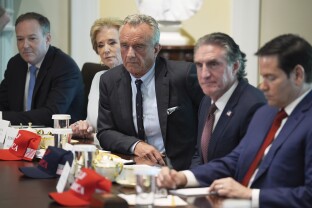The White House’s Make America Healthy Commission is calling for a new “vaccine injury research program,” shaking up the medical school accreditation process and zeroing in on fertility issues — all in the name of addressing chronic disease in children.
The administration’s MAHA Commission released a wide-ranging new strategy report Tuesday as a continuation of its May report, which identified the factors Health Secretary Robert F. Kennedy Jr. believes are contributing to trends like the rising rate of childhood autism.
“A lot of these 128 recommendations are things I’ve been dreaming about my whole life,” Kennedy said at an event announcing the release of the new report.
The May report was riddled with citation errors, including references to studies that didn’t exist, as NOTUS first reported, and was updated to misrepresent scientific research.
This secondary report on how to address chronic disease in children comes less than a week after Kennedy’s combative testimony on Capitol Hill, where he was forced to answer for some of the agency’s anti-vaccine actions. It was originally intended to be released last month, but was delayed.
Over four sections — “Advance Research,” “Realign Incentives,” “Foster Private Sector Collaboration,” “Increase Public Awareness” — the commission’s report vaguely lays out its strategy for redirecting the U.S.’s public health infrastructure to be in line with Kennedy’s vision.
That includes the secretary’s proposed reorganization of the Department of Health and Human Services to include the new “Administration for a Healthy America.” The reorganization plan was announced earlier this year, but stalled after it was challenged in court.
What’s in the latest MAHA report?
— NOTUS (@NOTUSreports) September 10, 2025
📺: @MargaretManto and @EvanMcS join @CNNThisMorning ⤵️ pic.twitter.com/PsvHgEQzB6
As part of the reorganization, the report says the National Institutes of Health will launch a new Office of Research Innovation, Validation, and Application to develop New Approach Methods, a catchall term for non-animal model research techniques. The Food and Drug Administration announced earlier this year that it would reduce its requirements for animal models in drug testing, saying it slows down the drug approval process.
The report also lays out how HHS will address conflicts of interest, something Kennedy has taken particular issue with when it comes to federal engagement with pharmaceutical companies.
Whether Kennedy will be able to successfully implement all of the recommendations the report makes remains to be seen. His efforts on vaccines in particular may be hemmed in by President Donald Trump, who told reporters on Friday that “You have vaccines that work. They just pure and simple work. They’re not controversial at all.”
When pressed, Kennedy said on Tuesday that he agreed with the president’s comments. The report offered no specifics on how the research around vaccine injury would look.
Some of the initiatives the report calls for, like asking the Environmental Protection Agency to study “air quality impacts on children’s health,” appear to correspond to already existing federal health programs — or to programs cut in the first few months of the Trump administration.
A spokesperson for the EPA said the agency was “confident” it had the resources to accomplish its goals around public health.
In particular, many of the recommendations related to dietary issues appear to be continuations of initiatives that have already begun, like a government-wide definition for ultra-processed foods and front-of-package nutritional labeling.
The report will almost certainly catch the eye of Kennedy’s MAHA followers, too, for what it leaves out. Pesticides, which Kennedy campaigned on banning, are mentioned only three times in the 20-page document, and even then only tangentially.
“A crop protection tool like pesticides is absolutely essential for America to not compromise our food supply at this point,” Agriculture Secretary Brooke Rollins said Tuesday.
EPA Administrator Lee Zeldin emphasized that the agency will be targeting “illegal pesticides” imported into the U.S. and “working with other partner agencies to crack down on that.”
The report also makes little comment on the use of AI, something the May report emphasized as a potential tool for multiple agencies. The strategy report says only that HHS will “prioritize research into the appropriate integration of AI to assist in earlier diagnosis, personalized treatment plans, real-time monitoring, and predictive interventions that prevent hospitalizations, reduce costs, and reduce the economic burden of chronic disease.” It designates pediatric and young childhood cancer as an “initial focus area.”
Michael Kratsios, director of the White House Office of Science and Technology Policy, said Tuesday that “the White House is eager to support HHS as it invests in research that uses AI systems to uncover the causes of cancer, identify cancer risks as soon as possible and intervene before cancer develops.”
Sen. Bill Cassidy told reporters before the report was released that if the conclusions the report draws are “truly reflecting the best understanding of the medical literature,” it will be possible to have “a lot of confidence.”
If not?
“If it is saying things like thimerosal causes autism, or that Tylenol causes autism,” said Cassidy, referring to two substances Kennedy has reportedly claimed do just that, “well that’s, of course, bogus.”
Sign in
Log into your free account with your email. Don’t have one?
Check your email for a one-time code.
We sent a 4-digit code to . Enter the pin to confirm your account.
New code will be available in 1:00
Let’s try this again.
We encountered an error with the passcode sent to . Please reenter your email.


